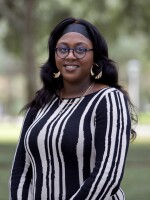For the past couple of years, public school teachers in Florida have navigated some challenging, and at times confusing, changes to what they teach and how they teach it.
Legislation was rolled out in 2022 with restrictions on classroom instruction on race, gender identity and sexual orientation. Transgender students have faced restrictions on what bathrooms they’re allowed access to. Teachers are now required to convey that under enslavement, some African Americans gained skills that later benefited them, a change heavily criticized by teachers and some state officials. And there’s been increased scrutiny, and in some cases removal, of books on teachers’ shelves and in school libraries.
WUSF’s Kerry Sheridan, who covers K-12 education and has been reporting on how teachers have been dealing with the new laws over the last couple of years, says in order to comply with a 2022 law on curriculum transparency, teachers have to have every book in their classrooms vetted by a media specialist. Otherwise, it’s removed from the shelf.
“A lot of districts across the state just closed down their classroom libraries altogether,” she said. “These are books teachers collect over the years. They could be biology books, reference books, things that kids could look at when they’re done with their assignment, just bolstering the classroom environment; those are widely gone.”
Based on her reporting and observation, she says these changes have had unintended consequences, like an increased workload for already overworked teachers.
This is all added to the other challenges teachers already faced like pay and workload as school districts struggle to fill staff shortages.
One of the most controversial new laws, the Parental Rights in Education law, or as critics call it, "Don’t Say Gay," has been clarified after a lawsuit was settled.
Gail Foreman is a high school social studies, history, and AICE psychology teacher at Booker High in Sarasota. She’s also the school’s Gay Straight Alliance sponsor. She says the new rules have deeply affected her students.
“They didn’t feel safe anymore. It made the kids question whether they should continue their education.”
She says this transition has been difficult for her. As the GSA sponsor, and one of the gay teachers on campus, her room was a safe haven for all her kids.
“The first thing was that they came in and they took anything that remotely looked rainbow out of my room, told me I had to take it down,” she said. “We had to cover up our books. Our district policy was if it hadn’t been vetted, the kids can’t see them or read them.”
Foreman says while her district hasn’t given teachers complete direction since the settlement of the parental rights in education lawsuit, there are beginning steps.
“I can’t say anything but the kids can,” she said. “If the kids want to talk about somebody in history being gay, or if the kids want to talk about a gay issue, the kids can talk about it all they want. I can’t bring it up.”
She has her special way to communicate with her kids, like clearing her throat when she hears something incorrect to signify that they need to double-check their information. However, she says she and the other gay teachers continue to walk on eggshells, unsure of how something may be interpreted.
Brandt Robinson, a history teacher at Dunedin High School, says as the GSA sponsor at his school, he can relate. Two years ago, at the city of Dunedin’s holiday parade, although their GSA was invited, he had a student ask if they would be safe in attending. He believes these laws were put in place to intimidate teachers but says they’re having great effects on the children.
Robinson teaches subjects like plantation slavery and says he now has to teach about “both side-isms” to things like race massacres. One way he deals with it, however, is to show his kids the standards and have them talk about it.
“I taught about the Wilmington race massacre and coup in 1898. Next week, I’m going to teach about Rosewood and Ocoee, which are state standards that teachers in U.S. history have to teach,” he said. “When I’m done with that, I’m going to put up the standard about how I’m supposed to show that these acts of violence weren’t just perpetrated by white Americans, but also by Blacks. I don’t know what the motivation was for changing that wording of the standard, but I’m going to defer to my students and ask them to tell me what they think about that.”
And that seems to be the way Foreman handles the situation as well, teaching her students but also allowing them to talk about it with her and each other.
“I think it’s important for kids to be thinkers and not just sit there,” she said. “It’s made my kids better students.”
Hear more of the conversation by clicking the media above. Or find “Florida Matters” wherever you get your podcasts.





